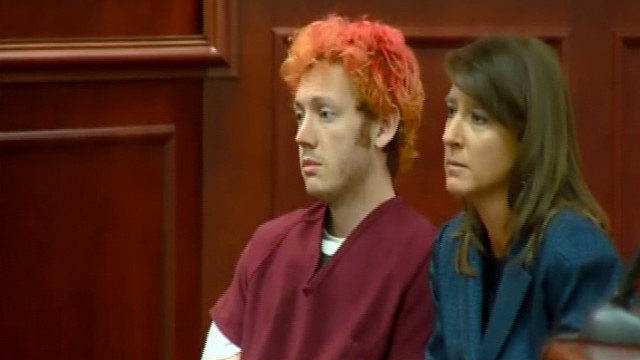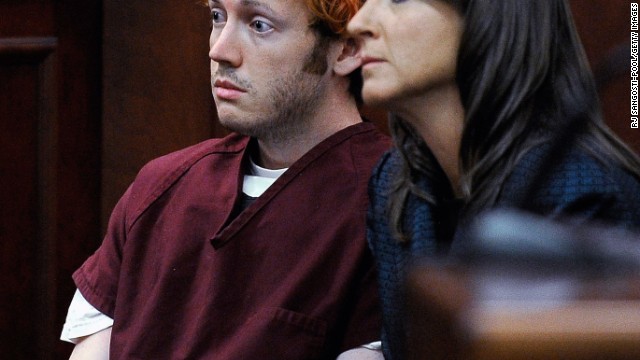Why did Colorado shooting suspect avoid social media?
|
|

Colorado shooting suspect James Holmes appears in court Monday, July 23.
Facebook or Twitter.
LinkedIn or Tumblr. We expect social media to shed light on a person's
personality, especially when, as in the case of Colorado shooting
suspect James Holmes, we're trying to explain the unexplainable.
As it turns out,
24-year-old Holmes, who stands accused of killing 12 people and wounding
dozens more during a shooting spree at a movie theater Friday, appears
to have left virtually no digital footprint. Media and law enforcement
investigating the shootings have found no traces of him online, aside
from a possible account on Adult Friend Finder, a romantic meet-up site,
according to police.
It's impossible, of
course, to draw broad conclusions about his mindset based on the fact
that he didn't share online. But Holmes' lack of an online presence has
emerged as a piece of the puzzle for people looking for answers.

"We could ask the same
questions about the lack of Web presence that we could for anyone who
isolates themselves. Was he socially isolated in all senses?" asked Dr.
Pamela Rutledge, director of the Media Psychology Research Center.
"We know that social
isolation can amplify the negative consequences of stress and increase
the risk of developing psychopathology. Some research has shown that
social isolation actually delays the positive effects of activities
found to be emotionally beneficial, such as exercise. ... What we don't
know is what caused Holmes to have such a break with reality."
Whatever his reasons, the lack of an online presence puts Holmes squarely in the minority among his peers.
About 81% of 18- to 29-year-olds in the United States use social media at least occasionally, said Lee Rainie, director of the Pew Research Center's Internet & American Life Project.
And surveys show that
college students like Holmes, who was a graduate neurosciences student
at the University of Colorado, are even more likely to use the sites.
But Rainie says it would
be a mistake to draw a direct line between his decision to eschew
social networking and a mindset that led to the alleged violence.
"It's not the norm for
someone of this age to have such a limited presence, in any form: no
blogs, no profile on a photo-sharing site and things like that," Rainie
said. "But it's also a mistake to think the everyone in this age cohort
is living every minute of their lives with social media. That's not the
case."
The survey didn't ask
respondents for specific reasons that they choose not to engage online.
But Rainie said Pew has heard numerous reasons, from concerns about
wasting time to privacy concerns to simply preferring face-to-face
interaction.
In a Pew survey from November, two-thirds
of respondents (67%) said that staying in touch with current friends is
a major reason they use social media, and half gave similar importance
to connecting with old friends. Only 3% said that finding a romantic
partner was a major reason for their of digital networking tools.
"It's certainly an
interesting element of his life that (Holmes) had such a limited digital
presence," Rainie said. "But it's not necessarily the case that this
means anything about the quality of his social world."
Dr. Tomas
Chamorro-Premuzic, a professor of business psychology at University
College of London, has studied the impact of Internet use on mental
health. He too says it's impossible to nail down its significance at
this point but listed a set of possibilities, from a sense of isolation
to distaste for Facebook as an emblem of "the status quo" to something
perhaps even more sinister.
"He (possibly) did not
want to have any reputation other than for what he was planning to do,
like someone who saves himself for the big stage or a single lead role,"
Chamorro-Premuzic said.
Similar attacks in the recent past have, in some cases, painted a different picture.
Jared Lee Loughner,
charged in the January 2011 shootings in Tucson, Arizona, that killed
six people and wounded congresswoman Gabrielle Giffords, was active on MySpace and YouTube, among other online networks.
Anders Behring Breivik was 32 when he killed 69 people, mostly teenagers, at summer camp in Norway in July 2011. Breivik was a prolific blogger who was active on Facebook, Twitter and other sites. He posted a video to YouTube only hours before his shooting rampage.
By contrast, reporters
looking into the mindset of Seung-Hui Cho, the 23-year-old student who
killed 32 people and wounded 25 others in an April 2007 massacre at
Virginia Tech, found almost no traces of him online.
The lack of a digital
footprint for Holmes has created some unpleasantness for an unexpected
group: people who share his relatively common name, live in the area of
the shooting and do have a Web presence.
"It amazes me how
insensitive, heartless and just plain old IGNORANT some people are in
this world," a different James Holmes, this one a fitness instructor
who, like the suspect, lives in Aurora, wrote on his Facebook page. "In
the last 24 hours I have received hate mail, racist remarks, and sexual
advances. I have over 400 friend requests in which a quarter of those
are ppl mocking the real killer to gain attention and this was all AFTER
the identity of the real killer was revealed ..."
James P. Holmes, who lives in the Denver area, left a similar note on Facebook, albeit in a more wry tone.
"I am not a 24-year-old
gun-slinging killer from Aurora, I am a 22-year-old book-slinging mass
eater from Littleton ... ," he wrote. "James Holmes happens to be a
pretty common name, surprisingly, so try not to jump the gun. Regards, A
different guy named James Holmes."
With few, if any,
conclusions to draw, Rutledge said the most interesting observation
about society as a whole may be how surprised we are that the suspect
did not use social media.
"It's a testimony to how
normal participating in the social media world is when we look at the
lack of presence as an anomaly," she said. "(We wonder,) 'What's wrong
with this guy that he's not at least on Facebook?' "





No comments:
Post a Comment